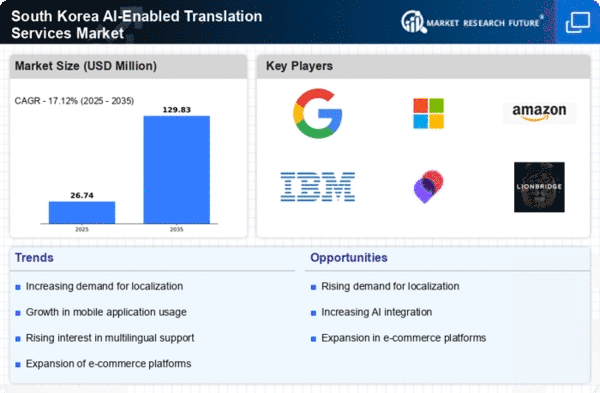Growing E-commerce Sector
The rapid expansion of the e-commerce sector in South Korea is a significant driver for the ai enabled-translation-services market. With more businesses establishing online platforms, the need for multilingual support becomes critical to reach a broader customer base. In 2025, e-commerce sales are projected to grow by 20%, prompting companies to seek translation services that can effectively communicate product information and marketing messages in various languages. This trend highlights the necessity for businesses to invest in ai enabled-translation-services to enhance customer engagement and drive sales, ultimately contributing to the growth of the industry.
Increased Global Trade Activities
As South Korea continues to strengthen its position in global trade, the ai enabled-translation-services market is poised for growth. The rise in international business transactions necessitates effective communication across languages, making translation services essential. In 2025, the volume of trade is projected to increase by 15%, leading to a heightened demand for translation services that can facilitate smoother interactions between South Korean companies and their international partners. This trend underscores the importance of accurate and timely translations, driving businesses to invest in ai enabled-translation-services to maintain competitiveness in the global marketplace.
Rising Demand for Localization Services
The ai enabled-translation-services market in South Korea experiences a notable surge in demand for localization services. As businesses expand their reach into diverse markets, the need for culturally relevant translations becomes paramount. This trend is particularly evident in the gaming and entertainment sectors, where localized content can significantly enhance user experience. In 2025, the localization services segment is projected to account for approximately 30% of the overall market revenue, reflecting a growing recognition of the importance of tailored communication. Companies are increasingly investing in ai enabled-translation-services to ensure that their messaging resonates with local audiences, thereby driving growth in the industry.
Technological Advancements in AI Algorithms
The ai enabled-translation-services market benefits significantly from ongoing advancements in AI algorithms. Innovations in machine learning and natural language processing enhance the accuracy and efficiency of translation services. In 2025, it is anticipated that improvements in AI technology will reduce translation errors by up to 25%, making these services more reliable for businesses. As companies increasingly rely on automated solutions for their translation needs, the demand for sophisticated ai enabled-translation-services is likely to rise. This trend indicates a shift towards more intelligent systems capable of understanding context and nuances in language, thereby elevating the industry standards.
Government Initiatives Supporting AI Development
The South Korean government actively promotes the development of artificial intelligence technologies, which directly benefits the ai enabled-translation-services market. Initiatives such as funding for AI research and development, along with policies aimed at fostering innovation, create a conducive environment for the growth of translation services. In 2025, government investments in AI are expected to exceed $1 billion, indicating a strong commitment to enhancing technological capabilities. This support not only accelerates advancements in translation accuracy and efficiency but also encourages collaboration between tech companies and educational institutions, further propelling the industry forward.
















